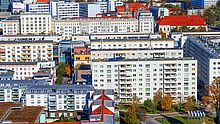However much public interest may be focused on the reforms of the electricity market within the energy transition, it is imperative not to forget that this major project cannot succeed without increasing energy efficiency, which means reducing energy consumption. The building sector accounts for almost 35% of the final energy consumption in Germany (2015), which clearly defines one of the principal areas where action is needed. dena recognised this early on and founded the Allianz für Gebäude-Energie-Effizienz (geea), Alliance for Building Energy Efficiency in 2011. It is a cross-sectoral alliance of leading companies and associations from the areas of construction, energy, skilled trades and science. The alliance pools the extensive competencies of almost 40 partners, using their skills to define strategic positions. They help to advance the cause of energy-efficient refurbishment of buildings.
Key points for more energy efficiency in the building sector
Below is an overview of geea’s main objectives and positions:
1. Consistent implementation of the heating transition
geea welcomes the measures prepared by the Federal Government to promote energy efficiency in buildings, and the National Action Plan on Energy Efficiency (NAPE), adopted in 2014, was an important milestone in this respect. Now it is important to put these measures into practice consistently, completely and quickly. The energy-efficiency strategy for buildings outlined in NAPE needs to be developed and fleshed out in order to define how the Federal Government targets – above all a largely climate-neutral building stock by 2050 – can be achieved.
2. Optimisation of funding
Financial incentives are the alpha and omega in terms of stepping up energy-efficient building refurbishment. Therefore, current funds need to be ramped up, and the introduction of an additional tax incentive is recommended. The funding programmes must also be subsidised and secured for the long term.
3. Communication, not obligation
Nothing will happen without the property owners. This is why proactive communication policies will be more purposeful than the introduction of regulations and compulsion. geea therefore advocates incentive policies, coupled with an open approach to technology and an unbiased treatment of energy sources.
4. Binding EU objectives
Energy-efficient buildings are becoming increasingly important on an EU level as well. The EU is currently preparing an efficiency strategy that is likely to place a focus on buildings. geea calls for binding energy efficiency targets in the individual member states of the EU.
5. Exploit digitalisation, connect sectors
The widespread digitalisation of all areas in life offers immense potential for an energy-efficient transformation of the building sector as well. For instance, it is now possible to connect electricity, heat and transport in a process that is known as the linking of sectors.
6. More services
The market for building efficiency currently lacks tailored services that help overcome typical obstacles. The service of energy savings contracting, for instance, is a good way of resolving investment and financing problems in refurbishment. Here, the government is called upon to create a suitable framework.
7. Establish an energy performance certificate, strengthen consulting
geea calls for the introduction of a mandatory energy requirement certificate and the establishment of a standardised and simple calculation procedure. Potential buyers can only correctly assess the value of a property if they have a reliable tool of this kind, which would also enable owners to credibly document what they have done to improve energy efficiency. Qualified consulting services to inform building owners of suitable measures to improve building efficiency are also necessary.
8. Remember non-residential buildings too.
Non-residential buildings account for a significant proportion of the final energy consumption in the building sector. Nevertheless, this building type is frequently neglected in targeted measures to increase efficiency. Here, also, it is crucial to strengthen efficient market instruments and to continue developing suitable service portfolios.
A more detailed description of the positions advocated by geea in connection with building efficiency are found on the website: www.geea.info
There you will find more information on geea’s activities.




